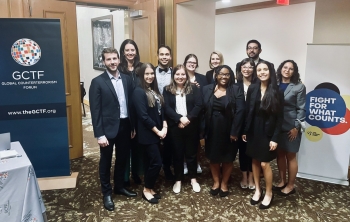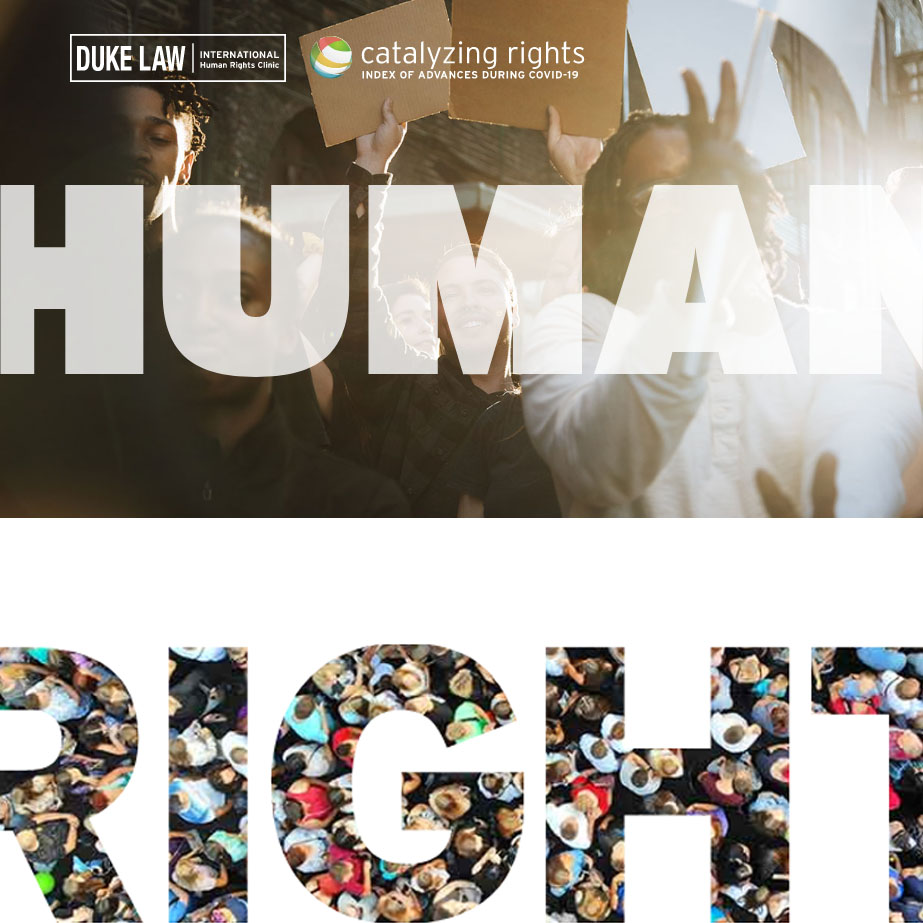Clinics
The Duke Legal Clinics allow students to build an experiential bridge between law school and practice. The International Human Rights Clinic and Advanced International Human Rights Clinic enable students to critically engage with cutting-edge human rights issues, strategies, tactics, institutions, and law in both domestic and international settings. Through weekly seminars, fieldwork and travel, students develop a range of practical tools and skills needed for human rights advocacy—such as fact-finding, litigation, indicators, reporting, and messaging—that integrate interdisciplinary methods and new technologies. Students also develop competencies related to managing trauma in human rights work, as well as the ethical and accountability challenges of human rights lawyering.
Clinic Projects
Types of clinic projects include those that: apply a human rights framework to domestic issues; involve human rights advocacy abroad; engage with international institutions to advance human rights; and/or address human rights in U.S. foreign policy. Students work closely with local organizations, international NGOs, and U.N. human rights experts and bodies to address a range of human rights issues, ranging from trafficking in persons to COVID-19 response measures to the gendered impacts of counter-terrorism efforts on human rights. This has involved, for example:
- undertaking research and drafting of high-level U.N. reports and guidelines and preparing sensitive U.N. fact-finding missions in numerous countries, including in Latin America and Asia;
- conducting fact-finding and documentation efforts on human rights and counter-terrorism that involves interviewing governmental, non-governmental, and intergovernmental organizations in London, New York, and Washington D.C. and collaborating with women’s rights organizations in contexts such as Iraq;
- providing strategic and legal guidance to non-governmental organizations in the United States on how to apply a humans rights lens to U.S. issues;
- convening and capacity-building of domestic, regional, and international actors on human trafficking issues, including in Amman, Jordan; and
- analyzing survey data of interviews conducted with women’s organizations, particularly in the Middle East and North African and Asian regions.
- making a submission to the U.N. Special Rapporteur on the promotion and protection of human rights and fundamental freedoms while countering terrorism analyzing, through a human rights framing, how national security policies in the Netherlands impact families and individual family members. Read the news story.
- researching, analyzing, and otherwise providing support on the international human rights issues most relevant to the North Carolina Commission of Inquiry on Torture (NCCIT), a bipartisan citizens’ commission, about the role that North Carolina played in the CIA’s post-9/11 rendition, detention, and interrogation (RDI) program.
- authoring a joint submission to the Commission on Unalienable Rights, co-signed by individuals at more than 20 U.S. law school human rights clinics, that identified and analyzed, among other things, the propositions as laid out by the Commission and the international human rights principles that should have been relied upon. This submission was drafted following the monitoring of the Commission’s public hearings by the IHRC. Read the news story.
- analyzing the international human rights framework that governs the issue of guns and domestic violence in the United States, and making a submission to the U.N. Human Rights Committee (HRC) containing this analysis in advance of the review of the United States by the HRC in 2019.
- researching different dimensions of human rights and trafficking in persons. In particular, developing expertise on the intersection of trafficking and terrorism, including providing oral testimony at the launch of an inquiry conducted by the All Party Parliamentary Group on Trafficked Britons in Syria; supporting U.N. report on human trafficking and terrorism (by the U.N. Special Rapporteur on trafficking in persons, especially women and children); and, in collaboration with United Kingdom (U.K.) civil society, submitting written evidence to the U.K. Parliament on modern slavery (focused on a new bill which purports to remove trafficking status for those coerced by terrorist groups).
- developing, launching, and maintaining an interactive database of more than 200 advancements to human rights made by governments during the COVID-19 pandemic. Read the news story.
Clinic Enrollment
For information on enrollment in the International Human Rights Clinic and Advanced International Human Rights Clinic, see the course description.
In addition to the International Human Rights Clinic and Advanced International Human Rights Clinic, other Duke Legal Clinics provide students challenging opportunities to deepen their substantive legal knowledge, strengthen their lawyering skills, and build their professional identities in areas that impact human rights.



